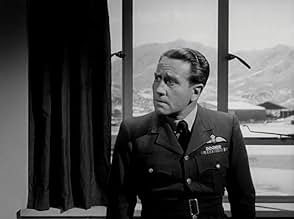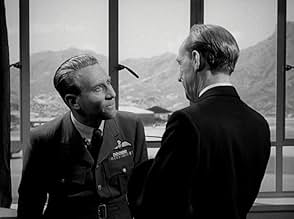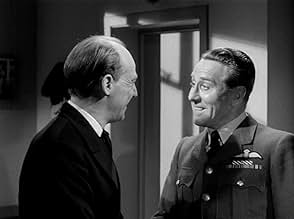IMDb RATING
7.0/10
1.7K
YOUR RATING
On a routine flight from Hong Kong to Japan, a British military transport aircraft's fate may or may not depend on a prophetic nightmare.On a routine flight from Hong Kong to Japan, a British military transport aircraft's fate may or may not depend on a prophetic nightmare.On a routine flight from Hong Kong to Japan, a British military transport aircraft's fate may or may not depend on a prophetic nightmare.
- Nominated for 4 BAFTA Awards
- 4 nominations total
Featured reviews
I saw this movie in 1955, when I was 35 and not so long after my time in the Air Force in WWII, so the RAF flight in the Dakota (same as our USAF C47 and the civilian DC3) resonated for me. But it was really the extraordinary level of suspense that made it so memorable. It starts with a dream of a Dakota lost in a storm and crashing onto a rocky beach. Crucial is the exact number on board. As the real trip progresses in stages, passengers get on and off. Just as it seems the fatal number has been circumvented, something happens to re-institute it. The way this was done was so believable and artfully handled. I particularly remember an episode with someone pointing out that telling the pilot the dream is not such a good idea; after all, he needs his skills to fly the plane safely, and if he takes the dream seriously and it makes him nervous...I have used this idea the rest of my life when directing hundreds of people. It touches on a profound bit of philosophy: when is deception justified? A great movie: if you get the chance, don't miss it.
This is a film which will stay with you for a long time. Its title sets the tone for what follows : a flight which, as it continues, looks more and more to be one that will end in disaster and thus, apparently, mean that a man's dream regarding it will come frighteningly true. The increasing sense of foreboding is alleviated at one time or another by a development that appears to be at odds with the dream, that is, until something else transpires which then sees the exact circumstances of the dream restored. It is a film which, not unnaturally, gives rise to tension-laden conversations about whether there is such a thing as fate, but that is not the main impact of this film, which is that one's attention is riveted from the opening scene to the final shocking end.
until
until
From the title, I was expecting a gambling yarn along the lines of "The Man Who Broke The Bank At Monte Carlo", but instead I got a very British suspenser directed by the late, venerable British film critic Barry Norman's old dad Leslie. It's got a good cast too of top British talent, including Michael Redgrave, Sylvia Sim and a young Denholm Elliott and just-as-young Michael Hordern, who actually looks pretty much like his later, much older self.
The story has the hallmark of the much later Hollywood "Final Destination" series as Hordern's non-traveling R.A.F. commander reveals to Alexander Knox's ambitious Far Eastern diplomat a weird dream he had the night before of a particular group of people including Knox, on a particular flight flying into a terrible life-threatening storm over Japan. Knox has never flown and dreads the thought when he's corralled into the aerial mission but is comforted when the personnel details Hordern provided don't match up to the expected passengers, but that all changes when the ducks all line up in a row overnight as the aeroplane type and planned passenger list eerily changes to match the related dream.
That list, which prominently includes Redgrave's senior Air Marshall and his P.A. Elliott, a former pilot now reduced to ground duties after suffering a nervous breakdown from his war-time pilot duties, is expanded to include initially two late-returning soldiers, then a young woman, Sim, a lordly government V.I.P. Ralph Truman and to complete the fateful eight (passengers) a spivvy, gobby businessman and his elderly male secretary who, added to the crew of five, headed by pilot Nigel Stock, take the total personage on board to unlucky 13. As the story of the dream leaks out, mostly from the terrified Knox, the passengers start to fear the worst, especially when the plane flies off course and straight into an almighty storm...
I found the first hour of the movie rather slow-moving, with stereotypical character types demonstrating the familiar British traits of reserve and stiff-upper-lip. The little model plane used for the exterior shots is hardly convincing either as it takes a supposed battering and just how or why Hordern dreams his dream is left unexplained. I also kept expecting some sort of emotional outburst from Elliott's obviously damaged character while Sim's character and that of the two working-class squaddies seem just like so much padding.
However, the tension ratchets up nicely as the film hurtles towards its destiny, there's a pretty effective crash scene and a neat pay-off joke as Hordern's character reveals the outcome of his latest sleep to his next acquaintance on the ground.
Overall, this was a good under-the-radar movie to get on board and if not an absolute high-flier, certainly made for an interesting and entertaining journey.
The story has the hallmark of the much later Hollywood "Final Destination" series as Hordern's non-traveling R.A.F. commander reveals to Alexander Knox's ambitious Far Eastern diplomat a weird dream he had the night before of a particular group of people including Knox, on a particular flight flying into a terrible life-threatening storm over Japan. Knox has never flown and dreads the thought when he's corralled into the aerial mission but is comforted when the personnel details Hordern provided don't match up to the expected passengers, but that all changes when the ducks all line up in a row overnight as the aeroplane type and planned passenger list eerily changes to match the related dream.
That list, which prominently includes Redgrave's senior Air Marshall and his P.A. Elliott, a former pilot now reduced to ground duties after suffering a nervous breakdown from his war-time pilot duties, is expanded to include initially two late-returning soldiers, then a young woman, Sim, a lordly government V.I.P. Ralph Truman and to complete the fateful eight (passengers) a spivvy, gobby businessman and his elderly male secretary who, added to the crew of five, headed by pilot Nigel Stock, take the total personage on board to unlucky 13. As the story of the dream leaks out, mostly from the terrified Knox, the passengers start to fear the worst, especially when the plane flies off course and straight into an almighty storm...
I found the first hour of the movie rather slow-moving, with stereotypical character types demonstrating the familiar British traits of reserve and stiff-upper-lip. The little model plane used for the exterior shots is hardly convincing either as it takes a supposed battering and just how or why Hordern dreams his dream is left unexplained. I also kept expecting some sort of emotional outburst from Elliott's obviously damaged character while Sim's character and that of the two working-class squaddies seem just like so much padding.
However, the tension ratchets up nicely as the film hurtles towards its destiny, there's a pretty effective crash scene and a neat pay-off joke as Hordern's character reveals the outcome of his latest sleep to his next acquaintance on the ground.
Overall, this was a good under-the-radar movie to get on board and if not an absolute high-flier, certainly made for an interesting and entertaining journey.
On display is one of the greatest scenarios ever presented in film - a flight over the Orient of which an anonymous British officer has had a dream premonition of disaster. What is so great about this idea and how it was executed here is that the dream itself is simply a catalyst for a psychological probing of the behavior of the passengers once they learn one-by-one about the particulars of the dream and how these particulars are playing out in their real flight. The theme then becomes the old-as-Shakespeare literary idea of fate vs. free will, but the strength of the filmmakers is that it is never resolved conclusively in the end. Even when the characters do hint at not letting a particular passenger on board the plane because this passenger has been prophesized to be an integral part of the disaster, they take no serious action to remove him, instinctively realizing that even that may not give them greater control over the situation.
The contrast of a modern technological artifice such as an aircraft with an archaic-style premonition is so brilliant because it portrays the ultimate paradox of human technological evolution: the farther human beings advance in their technological feats of control, paradoxically, the greater their lives are placed in the hands of the gods (fate) with all the many ways in which that technology can go tragically awry. For a simple idea, the filmmakers were obviously thinking, and they have added multiple layers to the story. "Night My Number Came Up" is a film I hope to see many times to pick up some themes I missed the first time. Like paintings, writing, and other forms of art, I believe that it is this characteristic which distinguishes great art from all the rest.
The contrast of a modern technological artifice such as an aircraft with an archaic-style premonition is so brilliant because it portrays the ultimate paradox of human technological evolution: the farther human beings advance in their technological feats of control, paradoxically, the greater their lives are placed in the hands of the gods (fate) with all the many ways in which that technology can go tragically awry. For a simple idea, the filmmakers were obviously thinking, and they have added multiple layers to the story. "Night My Number Came Up" is a film I hope to see many times to pick up some themes I missed the first time. Like paintings, writing, and other forms of art, I believe that it is this characteristic which distinguishes great art from all the rest.
Thrilling airplane picture, and I can't think of many other airplane pictures to compare it to. Much better than 'The High And The Mighty"(1954), and "Five Came Back"(1939), and different than "Lost Horizon"(1937). "The Night My Number Came Up" is a compelling and suspenseful film about differing conceptions of fate as presented in a dream - the dream of someone who was not a passenger on the trip.
Briefly, a man at a party recounts a dream he had about an airline crash. He is talking to a group who are flying the next day, and some of the travelers are spooked. He then departs and the group discuss his dream; some dismiss it and others show great concern. But during the trip elements of the dream begin to fall into place.
The acting is first-rate throughout the cast. The main character is seldom-seen Alexander Knox as a passenger flying for the first time. Stalwart Michael Redgrave is his flying companion, and Denholm Elliot and Sheila Sim lend strong support. The picture has a claustrophobic feel as most of it takes place in the passenger cabin, perhaps increasing the feeling of impending doom. This may be in the picture's favor, as it adds to the tension and heightens the suspense, the way many movies attempt but few succeed the way this one does.
Briefly, a man at a party recounts a dream he had about an airline crash. He is talking to a group who are flying the next day, and some of the travelers are spooked. He then departs and the group discuss his dream; some dismiss it and others show great concern. But during the trip elements of the dream begin to fall into place.
The acting is first-rate throughout the cast. The main character is seldom-seen Alexander Knox as a passenger flying for the first time. Stalwart Michael Redgrave is his flying companion, and Denholm Elliot and Sheila Sim lend strong support. The picture has a claustrophobic feel as most of it takes place in the passenger cabin, perhaps increasing the feeling of impending doom. This may be in the picture's favor, as it adds to the tension and heightens the suspense, the way many movies attempt but few succeed the way this one does.
Did you know
- TriviaThe script is based on a personal account by Sir Victor Goddard.
- GoofsClearly, different cockpits were used in different shots. The altimeter keeps switching back and forth between two quite different designs and layouts.
- Quotes
Mary Campbell: Anyone with sense has doubts.
- Crazy creditsOpening credits, prior to film title: There were 8 passengers 5 crew
- How long is The Night My Number Came Up?Powered by Alexa
Details
- Release date
- Country of origin
- Language
- Also known as
- The Night My Number Came Up
- Filming locations
- Ealing Studios, Ealing, London, England, UK(studio: made at)
- Production companies
- See more company credits at IMDbPro
- Runtime1 hour 34 minutes
- Color
- Aspect ratio
- 1.33 : 1
- 1.85 : 1(originally intended theatrical ratio)
Contribute to this page
Suggest an edit or add missing content

Top Gap
By what name was La nuit où mon destin s'est joué (1955) officially released in India in English?
Answer

































